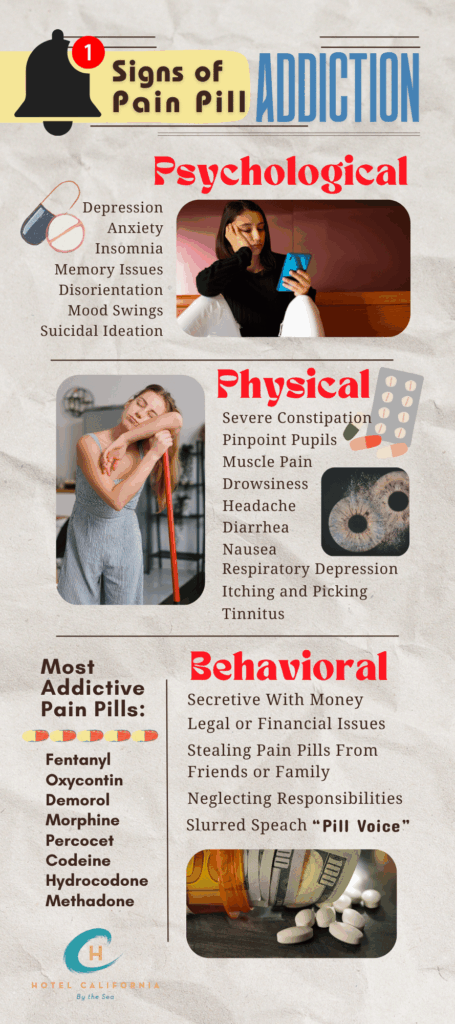Signs that someone is Addicted to Pain Pills
Pain pills are some of the most addictive substances. There are also telltale signs someone is addicted to pain pills. Symptoms range from physical, behavioral and psychological, indicating a person may have become dependent on painkillers or have become addicted to them. Pain pills or painkillers have been the leading cause of overdose death in the US over the past few decades. The shocking numbers are a result of the US consuming over 80% of all prescription opioids in the world, despite being only 5% of the world population.

Pain medication overuse is one of the most common forms of drug abuse in America. According to the Centers for Disease Control and Prevention, an average of 40 people per day lose their lives due to abusing prescription pain pills in the US. The National Institute on Drug Abuse claims that over 50 million Americans have abused painkillers to get high, contributing to the continuous opioid overdose epidemic. An estimated 70% of those who develop an addiction to pain pills will eventually move on to other opioid drugs like heroin, which is less expensive and easier to obtain.
What are Pain Pills?
Pain pills or painkillers are often prescription opioid medications used to suppress the effects of physical pain in a person’s body. It works by modifying signals in the central nervous system through the body’s opioid receptors. By blocking pain signals to the brain, it changes the perception of pain.
Opioid pain pills interact with the brain’s opioid receptors to create a surge of dopamine. Dopamine is a neurotransmitter that signals to the body to feel pleasure, which is then recorded into the brain’s system. The brain will remember that every time it encounters an opioid pain pill, it will trigger pain relief and pleasure. With continued use, the neurotransmitters in the brain become altered, leading to the development of an addiction and the inability to function without the drug.
Painkillers are synthetic opioid medications that are only available through a prescription. They are prescribed to treat short-term moderate to severe pain. They are highly addictive and, with extended use, can cause drug dependency and drug addiction. When addiction occurs, the person may have developed an opioid use disorder.
Opioid Use Disorder
An opioid use disorder is a condition in which a person has become psychologically dependent on the feelings of euphoria experienced from opioid painkillers. This person may regularly take these medications other than how they were prescribed. Instances such as taking more than prescribed or taking them more often than prescribed are forms of drug abuse.
With opioid use disorder, a person may develop cravings for the drug and experience extreme mood changes affecting how they interact with others on a daily basis. They will often forget work, personal and financial obligations and obsess over obtaining and how to obtain more opioids. In some cases, they will borrow medicine from others or even doctor shop in order to obtain prescriptions from other doctors in an attempt to get more opioids.
Physical changes such as weight loss from lack of sleep and lack of appetite, the development of flu-like symptoms and lack of personal hygiene are also common in opioid use disorder.

Signs someone is addicted to Pain Pills
There are many signs to look out for when suspecting a person of being addicted to pain pills. One of the biggest signs of cravings for the medication. Most often, the person has developed a tolerance and dependence on the drug. There will be persistent desires for painkillers that can go beyond the typical use. It can lead to obsessive thoughts and behaviors.
Behavioral Signs of Painkiller Addiction
- Obsessed with getting medication
- Doctor shopping for more prescriptions to get more pills
- Stealing pain pills from friends and family
- Experiencing financial issues due to pain pill use
- Experiencing legal issues due to pain pill use
- Decline in work and personal performance
- Withdrawing from friends and family, as well as social activities once loved
- Neglecting work and personal responsibilities
- Slurred speech
Physical Signs of Painkiller Addiction
- Drowsiness
- Pinpoint pupils
- Respiratory depression
- Tinnitus
- Nausea and vomiting
- Itching
- Chronic constipation
- Muscle pain
- Headache and impaired vision
- Increased tolerance for the drug
- Decreased blood pressure
Psychological Signs of Painkiller Addiction
- Depression and anxiety
- Insomnia
- Mood swings
- Memory issues
- Mental confusion
- Symptoms of psychosis
- Disorientation
- Poor decision-making
- Suicidal thoughts and behaviors
Check Your Insurance Coverage for FREE
Find out if your insurance covers addiction treatment in minutes. We accept most insurance!
Risk Factors that can lead to Pain Pill Addiction
- Genetics and biology – Researchers have found that certain clusters of genes have evolved and can, in fact, make a person more vulnerable to developing a substance use disorder.
- Environmental – Socializing with those who abuse painkillers makes you more likely to follow and engage in a similar behavior. This is due to peer pressure. These substances are easily accessible and therefore more it ore likely you will use them. Those who have a history of substance abuse or have experienced trauma are more likely to be affected by substance use disorder. A person with poor emotional coping skills may also turn to drugs in an attempt to self-medicate.
- Those who experience acute or chronic pain and have been prescribed opioid painkillers can also accidentally develop an addiction to the drug.
- Mental illness – Those who have a history of mental illness are more vulnerable to the use of substances.
- Boredom and curiosity of wanting to experience a drug-induced high.
The most Addictive Pain Pills
- Fentanyl – Fentanyl is a very potent synthetic opioid used to treat patients with severe or post-surgical pain, which is available in a lozenge, injectable solution or skin patch. It is commonly found in counterfeit drugs.
- Oxycontin – It is usually a tablet taken around the clock for treatment of moderate to severe pain that is expected to last for an extended period of time.
- Demerol – Demerol is meperidine, which is used with anesthesia to treat moderate to severe pain.
- Hydrocodone – This pain pill is sold under the name Vicodin and is used to treat moderate to severe pain caused by chronic injury or a surgical procedure.
- Morphine – This pain medication is a natural opioid that treats ongoing pain such as pain from cancer treatment.
- Percocet – This medication is a combination of an opioid and acetaminophen.
- Codeine – This is a natural opioid, which has effects that a short-lived, only lasting a few hours.
- Methadone – This pain medication is used in the treatment of opioid use disorder.
- Hydromorphone – The brand name Dilaudid provides short-term pain relief, mainly used in a hospital setting.
Reach out to Hotel California by the Sea
We specialize in treating addiction and other co-occurring disorders, such as PTSD. Our Admissions specialists are available to walk you through the best options for treating your addiction.
Treatment for Substance Use Disorder
Pain pills or opioid painkillers can become very effective medications when it comes to treating all types of pain. However, they are also extremely potent substances and can cause an addiction by accident and sometimes it is intentional. Either way, they can become psychologically addictive, especially when it comes to chasing the feelings of euphoria and pleasure. Professional treatment programs such as Hotel California by the Sea, provide programs such as opioid use disorder treatment.
We offer treatment at all levels of care including detox, residential, PHP and IOP. We utilize evidence-based treatment methods such as CBT, DBT and family therapy. Hotel California by the Sea is dedicated to helping clients reach their goals of sobriety and helping them overcome their addiction.
References:
https://www.parkroyalhospital.com/addiction/painkiller/signs-symptoms-withdrawal
https://rehabsuk.com/blog/recognising-the-signs-of-a-painkiller-addiction-in-a-loved-one
https://www.matclinics.com/matclinics-blog/pain-pill-addictions-igns
https://www.hopkinsmedicine.org/health/conditions-and-diseases/opioid-use-disorder
https://www.verywellmind.com/ten-most-addictive-pain-killers-22506
https://www.ashleytreatment.org/rehab-blog/signs-painkiller-addiction/
